Let’s start with some numbers. From 2 to 3 weeks. Or 14 to 21 days. Psychologists researchers discovered that our brain usually needs this amount of time to adapt to the new conditions. We need 21 days for a reorganization of our previous social existence. And now it has been about 2 months since we had to stay at home (I’m writing this based on my situation in Poland).
None of us thought that lockdown would take so long and that we will have to work out totally new rules on how to live in this total madness. The difficult moment for most of us was the beginning - adapting to a sense of danger and anxiety and the need of making some changes. Some of them were made thanks to a quick adaptation of digitalization and technology trends.
During the COVID-19, technology trends are playing a crucial role in keeping our society and businesses functional in a time of lockdowns and quarantines. Thanks to them we are not cut off from the information, we still have the opportunity to contact with relatives, and many of us can also work remotely without exposing ourselves to direct contact with other people.
Table of Contents:
1. Which technology trends help us to survive during the lockdown and adapt to rapid changes?
1.1. Extreme popularity of software used for remote working.
1.2. Increasing usage of social media apps.
1.3. Reducing digital exclusion - software programs for elderly people.
1.4. Ecommerce - Online shopping and robots delivery.
1.5. Foodtech - ordering by delivery mobile apps and dark kitchens.
1.6. Edtech - quick digital transformation for schools and self-improvements apps.
1.7. Live streaming revolution and Cultural events.
Which technology trends help us to survive during the lockdown and adapt to rapid changes?

#1 Extreme popularity of software used for remote working
It turned out that we can work from home and that most companies can switch their businesses into remote modules. Coronavirus can be a catalyst for an increase in the number of people working remotely, as stated by the study by Colliers International on a group of 3,000 office workers from 25 countries. According to preliminary analyzes, up to 82 percent of people would like to work from home one or more days a week after the COVID-19 pandemic has ended.
As you can check below, video calling and conferencing apps like Zoom have become one of the most popular applications in the world within only a few weeks. What makes Zoom stand out among other software tools like Skype or GoogleHangouts? One of the biggest advantages is the possibility of organizing video conferences with up to a hundred participants. In addition, there are features that facilitate remote work - sharing the desktop and attachments, or the ability to join the meeting from any device.
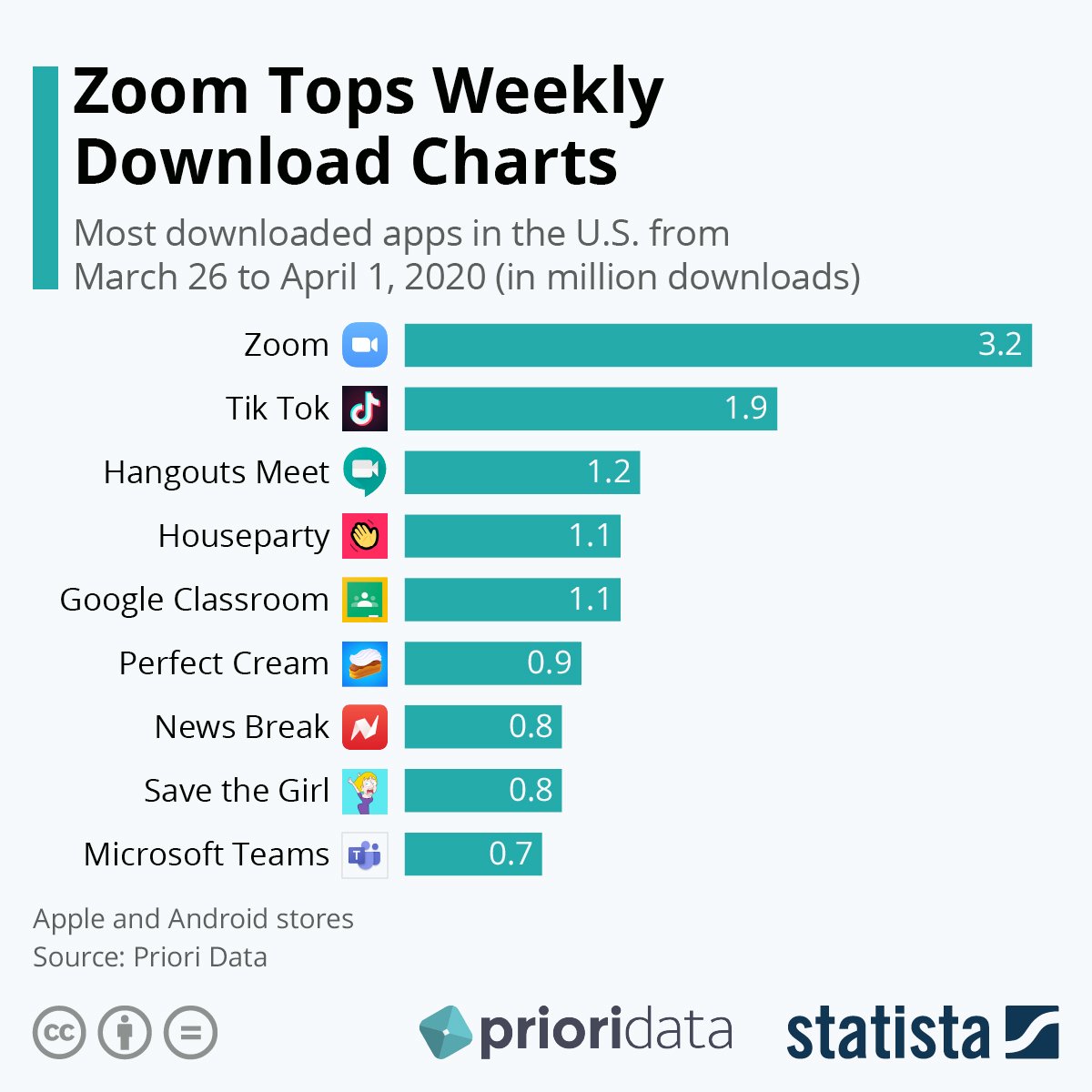
Source: statista.com
#2 Increasing usage of social media apps
Researchers have found out that staying at home during a coronavirus pandemic has a significant impact on consumer habits. According to Nielsen studies - it appears that during crisis situations such as floods, hurricanes, wildfires, earthquakes, terrorist attacks or global pandemics, traditional and social media are used more often to keep up to date, kill time, seek relief, or stay in touch with others. Mark Zuckerberg, CEO and Founder of Facebook, admitted that the use of such as WhatsApp and Messenger is twice as high as usual. And the Facebook servers themselves are overloaded to the limit. Not only do we search for up-to-date information there, we share opinions and connect with our communities, but we can also watch how the current power of social media has increased sales of local small businesses.
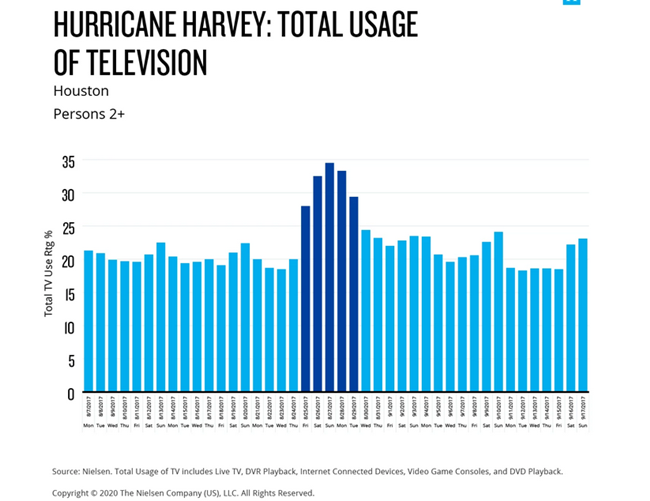
Source: Nielsen.com
And what about dating apps?
Dating sites have enjoyed growing popularity for many years. From year to year, there are more and more users who log in with the hope of finding a partner, friend, casual relationship or just a person with whom they can talk. The popularity of this type of portals is caused by the constant lack of time for traditional ways of meeting new people.
Love can meet us anywhere, anytime. However, it turns out that you don't have to leave the house to get to know your "other half". According to the reports and “Surveys carried out and analyzed by Stanford University show that between 1995 and 2017 the number of heterosexuals who met their partner on the internet rose sharply from 2 percent to 39 percent.” It’s a huge increase over the years. As you can see in the chart below people had previously met through family and friends or at parties, restaurants and others and nowadays online meetings is in the first place.
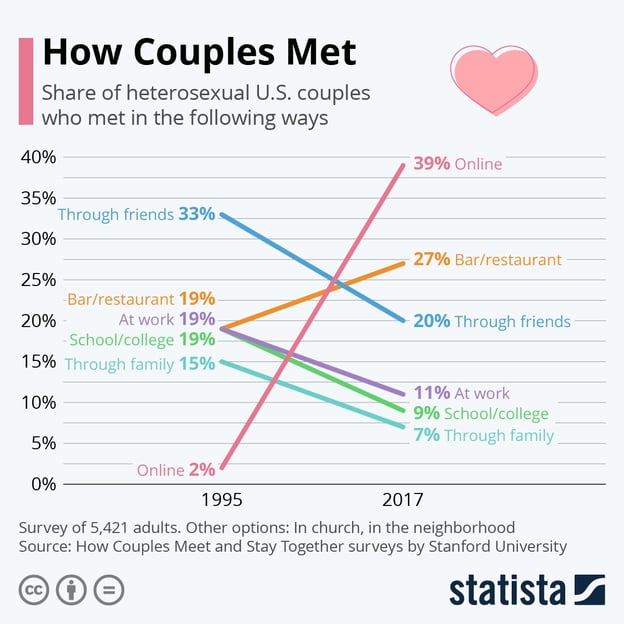
Source: statista.com
You can also ask what about dating during a pandemic?
Coronavirus has radically changed the lives of most people in a few weeks. He affected almost all areas and did not miss the issue of our relations. Now everyone is trying to avoid meetings and stay at home whenever possible. It also means partial stagnation in social life.
“With the coronavirus keeping people indoors, singles aren’t just meeting online. They’re holding virtual dates over video chat services like Zoom and FaceTime.
You can notice that even during the coronavirus pandemic, there are plenty of interesting options to meet fascinating people, and maybe also the love of your life. Our client Dating sites and chat rooms are a great antidote to loneliness, so it's worth taking advantage of the opportunities they give.
#3 Reducing digital exclusion - software programs for elderly people
Paradoxically, the currently developing pandemic may be a forced test for us whether we are technologically ready to properly function in the conditions of physical isolation of individuals, especially for elderly people. Caroline Abrahams, charity director at Age UK, tells The Independent: social contact is particularly important for older people who may be less savvy with technology. “It is also time to think creatively about ways for people to stay in contact with each other and keep morale up,” she says. “Now it is more important than ever to stay in touch over the phone, online or by mail.” More than one in four people over the age of 65 do not use the Internet, according to a 2019 Pew survey.
The Internet has become the only tool that can keep us connected and sane at the same time. CHD Living, a group of care residential centers, has been trying to encourage the elderly to keep up with the rest of the world online. In the meantime, they digitised the campaign which goal was to find people who were eager to help battle isolation, in order to do it people could virtually adopt a grandparent and stay in touch with them by sharing videos to brighten their day.
One example of a tool which helps retired people is Frindow App, an UK based platform. It was created to get connected with your nearest community and make new friends through features like live chat, messages, forums and groups based on users geolocation data also during this madness time.
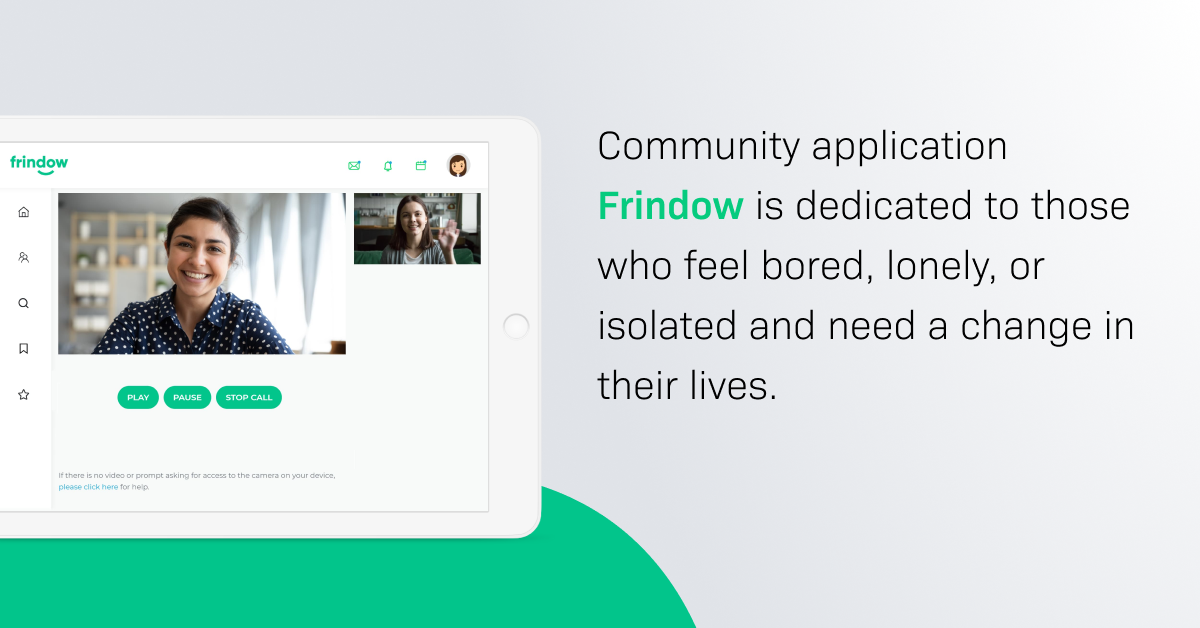
#4 Ecommerce - Online shopping and robots delivery
For many of us, shopping online is now a godsend, which also means no need to leave our houses. As you can easily see below, the e-commerce market is now well for those industries that belong to necessities. These include groceries and those that help us maintain personal hygiene, tidiness at home and also keep us in good shape and health.
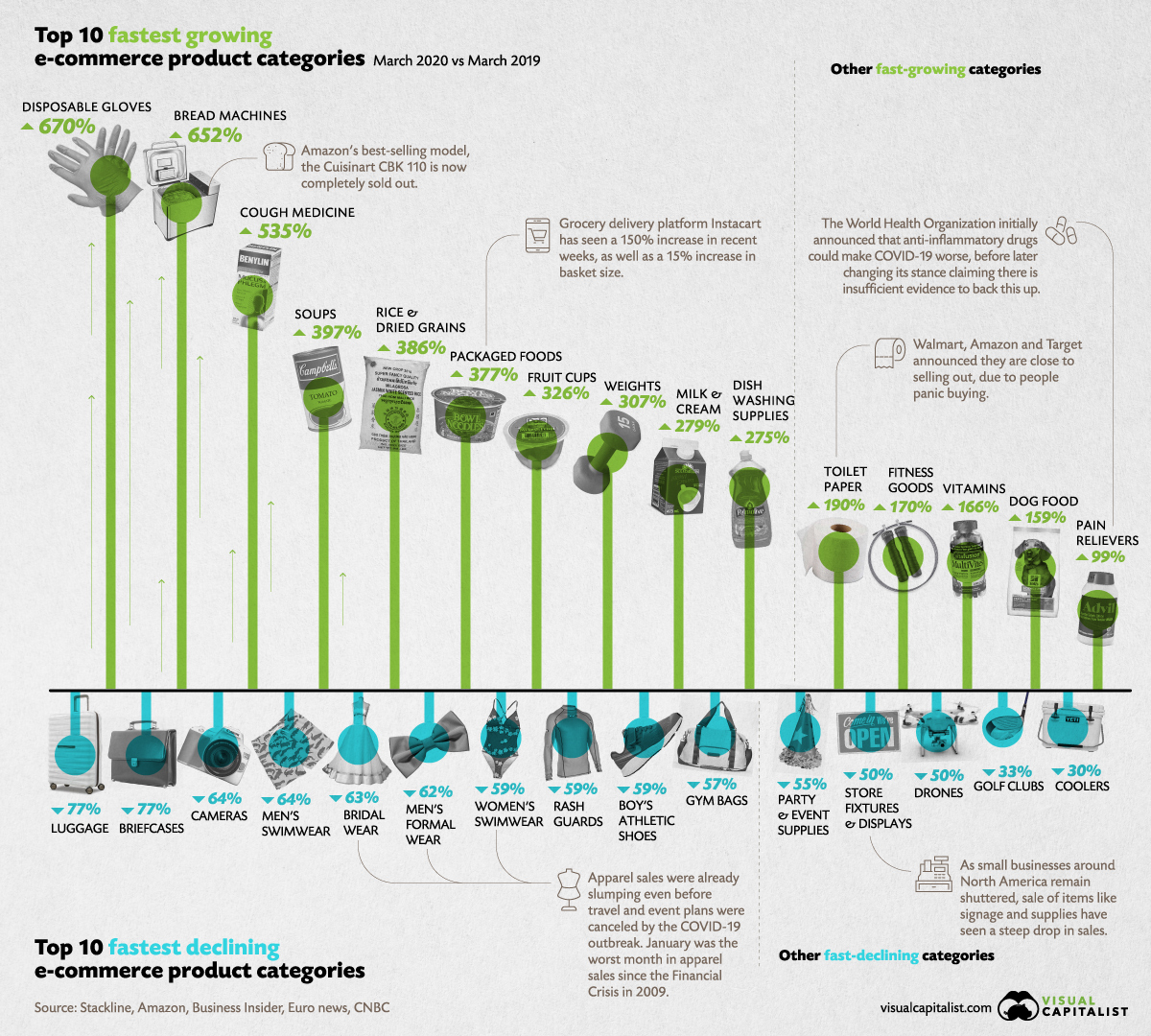
Source: visualcapitalist.com
Online shopping needs to be supported by a robust logistics system. In-person delivery is not virus-proof. Many delivery companies and restaurants in the US and China are launching contactless delivery services where goods are picked up and dropped off at a designated location instead of from or into the hands of a person. I think that it will be something common and there will be a huge expansion of robotics in our daily lives. It was already forecasted earlier for 2020 but Covid will only accelerate it.
Summarizing, after the current situation, the trade, distribution and logistics industry will opt for even greater process automation. Enterprises will make significant investments in technology and artificial intelligence. The winners will be those who adjust to change, think ahead and plan strategically for the post-pandemic world.
#5 Foodtech - ordering by delivery mobile apps and dark kitchens
The growing popularity of aggregators for ordering food online and the pace of life cause the so-called dark kitchens, i.e. premises specializing in selling meals only for delivery. This will be the future for foodtech industry.
Uber Eats and Glovo introduced non-contact food delivery. They were instructed to ring customers' doors and leave a bag of food outside the door. Another case of POS software which launched a special dedicated solution during covid is DirectBistro. It is a mobile app that you can use to browse the menu of many gastronomic establishments, order meals and pay online. All you have to do is download the application from Google Play or the App Store to your smartphone.
#6 Edtech - quick digital transformation for schools and self-improvements apps
This is another aspect of the digital revolution that society had to get through due to the crisis. After a pandemic, schools will not move to the Internet. Perhaps for a moment everyone - teachers, students and parents - will have enough technology in the rhythm of their days. However, something will change for sure. Transformations will not only relate to even more efficient navigation in the world of e-science and e-didactics or the use of digital tools. The epidemic will broaden our horizons.
Platforms and applications for self-improvement are experiencing an upswing right now. Understandable, because we have more free time now and we are more willing to broaden our knowledge using business, educational and languages apps or listening to podcasts on Spotify.
#7 Live streaming revolution and Cultural events
Life without music would be a mistake - said Friedrich Nietzsche. Music and art in general makes us happier. Because it stimulates the release of dopamine - called the happiness hormone, reduces stress and improves health. The more music, the lower the level of cortisol - called stress hormone.
The consequence of the pandemic was also the cancellation of concerts, exhibitions and other cultural events. Cinemas, theaters and museums were closed. Thus, artists and institutions involved in culture found themselves in a crisis situation, which exists thanks to their viewers and listeners.
In fact, it turned out that we didn't have to wait long for the first concerts, performances, and cinema premieres in the online world. In recent weeks we have had a real rash of live concert broadcasts. They all took place in small rooms, although the artists who presented themselves in this kind of art form on YouTube or Instagram could fill in several stadiums. In this case you can see how much need this type of online actions have.
Popular apps like Spotify, Tidal, Amazon Music, YouTube Music, Facebook and other major streaming brands have also recently begun joint efforts to provide creators with additional income during a coronavirus pandemic. All companies have paid a total of $ 2 million to the accounts of organizations involved in obtaining funds for musicians.
Conclusion
The global crisis will probably be one of the key events of 2020 and will have implications that will persist for a decade. Nothing will be the same as before the pandemic. That’s for sure. I think we should get rid of all the illusions and be certain that it will change the whole technology industry. Despite all of this I see a huge potential for digitalization. The world will be more technologically advanced after Covid19 and ready for quick implementation of innovations.
The difficult situation will give us many changes, challenges but also evolution. It is worth to notice the opportunity for business development following tech trends during pandemic. If you are wondering, if you can quickly set up an online store, educational, social app or other ideas that will come to your mind - remember, we are here to help you achieve your goals.
Even if you have only an app idea, we can customize software solutions and create it, and I think Discovery Phase will be the best for your case!


.jpg)



